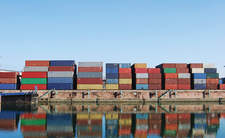Keep your containers updated with What's up Docker?
Container Cadence

© Lead Image © Ulrich Müller, 123RF.com
Keeping multiple Docker containers updated reliably can become quite a challenge. Enter What's up Docker?
When you start running various services in containers on your home servers, you'll need a reliable method to keep them updated. Projects continuously release new versions, not only to introduce new features, but also to address security vulnerabilities. So even if you're satisfied with the current feature set, neglecting updates can expose you to security risks.
However, updating your containers also comes with some risks. A new version might introduce incompatible changes, demanding your attention. In the worst case, you need to spend several hours resolving those issues, and of course this always happens at the most inconvenient times. So it's not recommended to just periodically update all your containers to the latest version or automatically install every new release and hope for the best.
Best Practices
How do you manage these risks? Before performing any updates, you should review the release notes of each new container version to check for breaking changes. However, this requires finding these release notes first. Therefore, you need a system that notifies you when a new update becomes available, preferably with a direct link to the release notes to save time.
[...]
Buy this article as PDF
(incl. VAT)
Buy Linux Magazine
Subscribe to our Linux Newsletters
Find Linux and Open Source Jobs
Subscribe to our ADMIN Newsletters
Support Our Work
Linux Magazine content is made possible with support from readers like you. Please consider contributing when you’ve found an article to be beneficial.

News
-
New Linux Botnet Discovered
The SSHStalker botnet uses IRC C2 to control systems via legacy Linux kernel exploits.
-
The Next Linux Kernel Turns 7.0
Linus Torvalds has announced that after Linux kernel 6.19, we'll finally reach the 7.0 iteration stage.
-
Linux From Scratch Drops SysVinit Support
LFS will no longer support SysVinit.
-
LibreOffice 26.2 Now Available
With new features, improvements, and bug fixes, LibreOffice 26.2 delivers a modern, polished office suite without compromise.
-
Linux Kernel Project Releases Project Continuity Document
What happens to Linux when there's no Linus? It's a question many of us have asked over the years, and it seems it's also on the minds of the Linux kernel project.
-
Mecha Systems Introduces Linux Handheld
Mecha Systems has revealed its Mecha Comet, a new handheld computer powered by – you guessed it – Linux.
-
MX Linux 25.1 Features Dual Init System ISO
The latest release of MX Linux caters to lovers of two different init systems and even offers instructions on how to transition.
-
Photoshop on Linux?
A developer has patched Wine so that it'll run specific versions of Photoshop that depend on Adobe Creative Cloud.
-
Linux Mint 22.3 Now Available with New Tools
Linux Mint 22.3 has been released with a pair of new tools for system admins and some pretty cool new features.
-
New Linux Malware Targets Cloud-Based Linux Installations
VoidLink, a new Linux malware, should be of real concern because of its stealth and customization.
